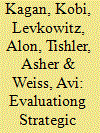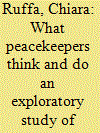| Srl | Item |
| 1 |
ID:
087000


|
|
|
|
|
| Publication |
2009.
|
| Summary/Abstract |
This study evaluates the order of magnitude of the monetary cost of achieving an international strategic limitation agreement on weapons of mass destruction (WMD) in an asymmetric arms race, with applications to the Israeli-Syrian and the North versus South Korean conflicts. It extends the Kagan et al. (2005) framework and develops a model of resource allocation between expenditure on civilian government consumption and on security in a non-cooperative (Cournot) arms race between a developed country and a less-developed country. The model is used to predict the optimal mix of weapons of the two countries engaged in the arms race, and to evaluate the applicability of international strategic WMD limitation agreements. Applying the model to the arms race between Israel and Syria shows that if considered from a purely monetary perspective, such an agreement, in which the monetary transfer to Syria is made by either Israel or a third party, is within reach. A strategic agreement to limit North Korea's WMD is also economically feasible, but only when the monetary transfer to North Korea is shouldered by a third party such as the USA or a coalition of neighboring countries.
|
|
|
|
|
|
|
|
|
|
|
|
|
|
|
|
| 2 |
ID:
174855


|
|
|
|
|
| Summary/Abstract |
Can positive domestic messages generated by a foreign policy of engagement toward another country change public views regarding that state? How resistant are such changes to events that contradict the positive messages? I argue that while positive government messages about an adversary can significantly improve public opinion, highly consequential foreign policy events that contradict the messages influence public opinion at the cost of elites’ ability to shape it through their messages. Such differing effects can lead to a polarization of opinion when the content of the messages and the nature of events diverge from each other. Leveraging the unpredictability of North Korea’s foreign policy behavior, the South Korean government’s sustained policy of engagement toward it during the years 1998–2007, and North Korea’s first two nuclear tests to examine the relative impact of consequential foreign policy events and elite messages on public opinion, I find strong evidence consistent with this argument.
|
|
|
|
|
|
|
|
|
|
|
|
|
|
|
|
| 3 |
ID:
090188


|
|
|
|
|
| Publication |
2009.
|
| Summary/Abstract |
These days when North Korea conducts a nuclear or missile test, the preferred metaphor in Washington is to compare Kim Jong II to a spoiled child.President George W. Bush used to say the North's Dear Leader" was like a baby throwing food on the floor in the hope that the adults would pick it up.When asked about North Korea during a recent trip to the region, Secretary of State Hillary Clinton said that as a mother she was already familiar with small children acting out to gain attention.
|
|
|
|
|
|
|
|
|
|
|
|
|
|
|
|
| 4 |
ID:
137617


|
|
|
|
|
| Summary/Abstract |
This exploratory article points out how armies differ in the performance of their daily military activities during a peacekeeping mission and analyses the role of contrasting perceptions of the mission operational environment in explaining this variation. As a first step, this article documents systematic variations in the way French, Ghanaian, Italian, and Korean units implement the mandate of the UN mission in Lebanon in their daily military activity. Second, it shows that the four armies also interpret or “construct” the operational environment differently and in a way that is consistent with their different military behavior. Third, preliminary evidence suggests that previous experiences of each army influence the way in which the operational environment is constructed. Data were collected combining participant observation in Southern Lebanon with questionnaires and interviews. This article thus builds on sociological works on different operational styles but takes a methodological approach closer to that in security studies.
|
|
|
|
|
|
|
|
|
|
|
|
|
|
|
|